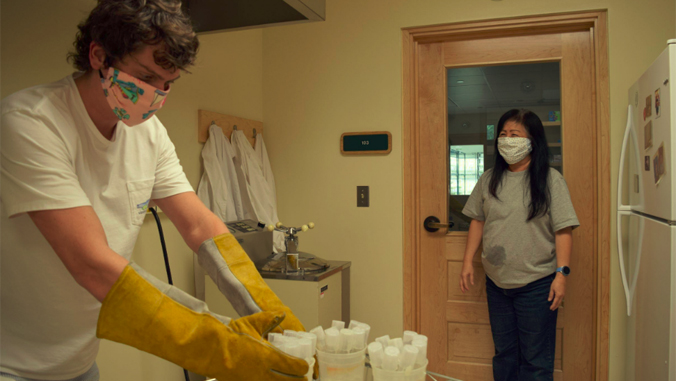
As museums, zoos, aquariums and botanical gardens worldwide have temporarily shut down to prevent the spread of COVID-19, staff members are hard at work behind the scenes caring for the precious collections that will be waiting for the day visitors can return. The University of Hawaiʻi at Mānoa’s Lyon Arboretum is no different. Closed to the public since March 19, the staff has been working a modified schedule to make sure operations continue and the plants are well-taken care of.
The Hawaiian Rare Plant Program (HRPP), which the Micropropagation Lab and Seed Conservation Lab operate under, plays a vital role in preventing the extinction of Hawaiʻi’s most endangered plants. Since 1992, the Micropropagation Lab has successfully grown approximately 300 of the more than 1,400 Hawaiian plant taxa using micropropagation techniques.
In the Seed Conservation Lab, more than 25 million seeds are banked, representing more than 600 taxa of native Hawaiian plants. However, due to COVID-19, the program’s plant conservation efforts have significantly slowed down, as plant and seed collection submissions have been greatly reduced.
Nellie Sugii, HRPP manager, said partner organizations have been asked to stop plant collection submissions unless there is an emergency or collection opportunities that cannot be delayed. Limiting collection submissions was a mutual decision by the collective partnerships of organizations working with the Department of Land and Natural Resources Division of Forestry and Wildlife (DoFAW).
Nate Kingsley, the HRPP Seed Conservation Lab technician, said that seed collections from DoFAW and the Plant Extinction Prevention Program have also been significantly reduced. The lab is still able to process new accessions and has more time to focus on the backlog of scheduled viability tests.
“Although the pandemic is a bad situation, we have been able to effectively use our time to do things around the lab we normally wouldn’t have had the time to do. Rather than worrying, we are optimistic that we will be all caught up and well prepared for future proceedings as soon as things return to normal,” Kingsley said.
Shifting operations
Kingsley and Sugii said program operations have shifted to plant maintenance and research, since educational tours have been canceled during COVID-19. Prior to the outbreak, the micropropagation lab was a hub of activity as school groups were able to tour the lab through the viewing lanai and conservation groups were often meeting in the lab conference room. Now, it is much quieter as entry to the facility has been greatly restricted as all meetings and tours have been stopped.
HRPP lost nearly 80 hours of weekly manpower as some employees work from home and volunteers have been instructed to stay home until they are cleared to return. Fortunately, Sugii said the program still receives help from three student workers, two Kupu interns and two volunteers. In both labs, strict social distancing and regular cleaning of workstations is practiced.
—By Raedelle Van Fossen
Related UH News stories:
- Lyon Arboretum Hawaiian plant conservation efforts highlighted, March 16, 2020
- Critical piece of Native Hawaiian plant conservation completed, January 28, 2018
- Hawaiʻi plant conservation gets a boost, March 14, 2017
- New Lyon Arboretum laboratory will expand Hawaiian plant conservation, June 7, 2016

